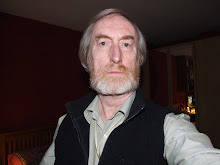I like to start at the Historical Society, absorb a few names, before I head for the courthouse. Unfortunately, The Historical Society chooses Tuesdays to stay open in the evening, and therefore doesn't open till the afternoon.
So I start at the courthouse. Being a city, it has gentlemen with guns to look up my bottom before I get in. And when I get in, it turns out that the Recorder of Deeds is now in another building. They think it's quite funny, but they return my knives, cameras, and recording devices without a murmur.
This county is computerised. I can look up names, I can look up addresses, but I can't lift up big heavy tombs and bump into the right thing by accident. There is no 'collateral' searching. So I find very little. To be fair, it must be much better if you're a lawyer doing what the records are kept for. I find references to "at what is known as Glasgow", and "Glasgow Estate", but nothing leading back any distance in time. Of course, when it acquired its name, this was Philadelphia County, and a crown colony, so all this is probably a waste of time anyway.
As President Reagan said after he got shot, "All in all, I'd rather be in Philadelphia". (That's what W C Fields proposed as his epitaph, but it was never used as such). Perhaps I need to go there.
The McCalls, it would seem, were a fabulous family, in the sense of rich and powerful. George and his wife had their portraits painted by Hessulius, the pre-eminent American portrait painter of the time. The children belonged to exclusive dining clubs, one of which restricted itself to 25 members. They married into other wealthy and powerful families. One daughter married the son of the Governor of New York, himself a Scot, another the son of the President of the New Jersey Provincial Council, and yet another the Mayor of Philladelphia. The sons, like their father, were on the City Council. They were active in the Dancing Academy, an attempt (apparently successful) to emulate the goings-on in Bath (don't forget, this is a colony). But they were also active in the St Andrew's Society, which, although it enjoyed dining and socialising, also did charitable work among the distressed Scots of Philladelphia. Half of them were married in Christ Church, where George was a vestryman. Christ Church is sometimes described as the first church of America, with seven signatories to the Declaration of Independence, including Benjamin Franklin, in its graveyard (the St Andrew's Society, by the way, boasts five). Christ Church, perhaps surprisingly was CofE.
One very odd fact has to be reported. George's second daughter, Anne, married her cousin, who had come from Scotland, and was named for their grandfather, Samuel. And then her younger brother, who was also named for their grandfather, married someone called Anne. If you wanted to hide your identity, you couldn't do it better.
And it wasn't a "rags to riches" story, either. The grandfather, Samuel, was a wealthy Glasgow merchant, and the grandmother was the daughter of a (Scottish) Court of Sessions judge.
I guess if George wanted to call this place "Glasgow", "Glasgow" it was going to be.
Later that night, I found myself drinking from a glass advertising the "Intercourse Brewing Company" "Ho, ho, ho", I thought, "they're real cards, these micro-brewers. That's not a gnat's gnipple away from "Dog's Bollocks" and the like. But it does seem an odd package, beer and intercourse. Not reputed to go too well together.
So I asked the Landlord. "Oh, no", he said, "Its from Intercourse. That's just up the road." And so it is. I've looked it up.
It's even got a Best Western, the "Intercourse Inn". You couldn't make that up, could you? "Why don't we go away for the weekend, darling, get to know each other a bit better".
"What a wonderful idea, darling. Where shall we go?"
"Well, I know a wonderful little Inn, darling, very out-of-the way".
"What's it called, darling?"
...
It's not going to work , is it?




No comments:
Post a Comment